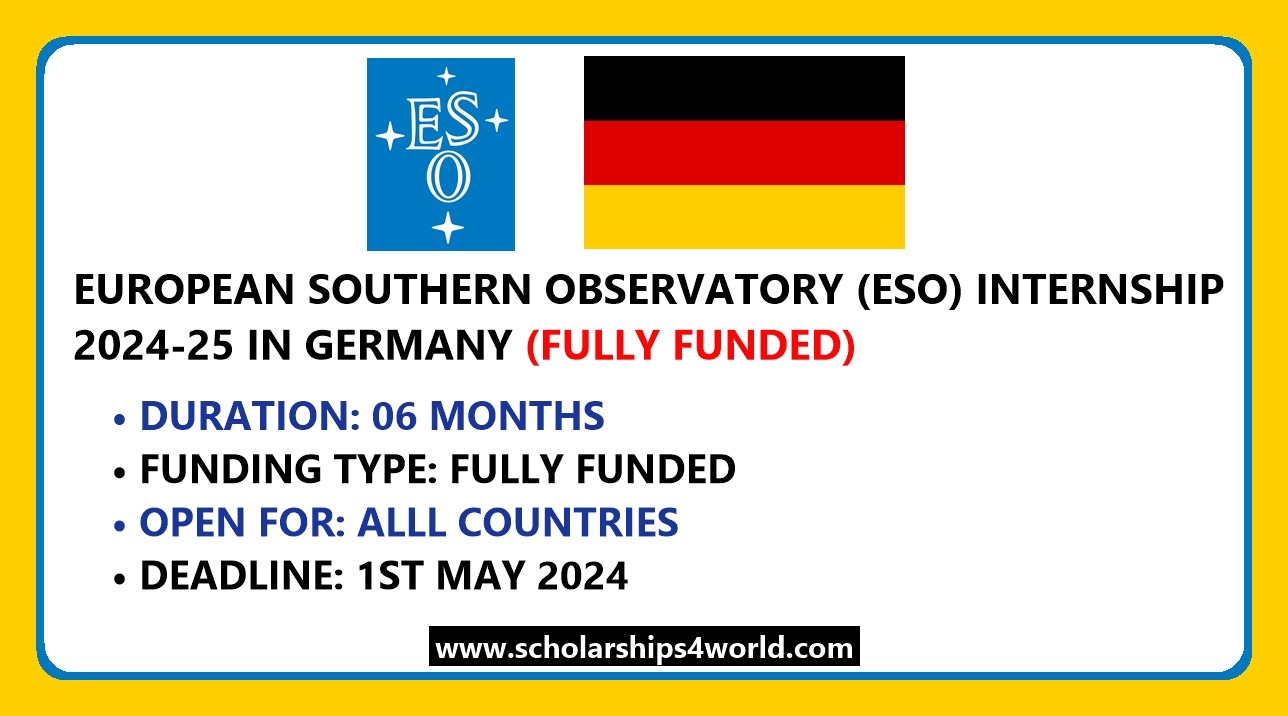The European Southern Observatory (ESO) Internship in Germany might be the perfect opportunity to jumpstart your career in science communication. Offered by ESO, the leading intergovernmental organization for ground-based astronomy in Europe, this fully funded internship equips aspiring science communicators with the skills and experience to bridge the gap between cutting-edge scientific discoveries and the general public. The ESO Education and Public Outreach Department (ePOD) spearheads this program, offering a unique platform for interns to gain invaluable exposure to the world of astronomical research. Unlike traditional astronomy internships that focus on scientific data analysis or telescope operations, the ESO Internship specifically targets science communication. Here, interns will delve into the exciting world of transforming complex astronomical concepts into engaging and accessible content for a broad audience.
There are no restrictions on nationality, making this a truly international opportunity. Whether you’re a recent graduate with a degree in science communication, journalism, or a related field, or a seasoned professional seeking to refine your science communication skills, the ESO Internship welcomes applications from passionate individuals eager to ignite public interest in astronomy.
ESO Internship in Germany (Fully Funded) Summary
- Program: Science Communication Internship
- Institution: European Southern Observatory (ESO)
- Location: Garching, Germany
- Deadline: 31st December 2024
- Eligibility: Open internationally
Financial Benefits:
- Fully Funded: The ESO Internship covers all program costs, including accommodation and travel within Europe to attend ESO events (if applicable).
- Monthly Stipend: Interns receive a monthly stipend to cover living expenses during their internship period in Germany.
Eligibility Criteria for the ESO Internship:
- Academic Background: Ideally, you should be currently enrolled in a university program leading to a degree in science communication, journalism, or a related field.
- Language Skills: Fluency in written and spoken English is a mandatory requirement for the program. This ensures effective communication within the international ESO team and allows you to develop content for a global audience.
- Experience: While not strictly mandatory, prior experience in science communication is highly valued. This could include involvement in science journalism, educational outreach programs, or creating astronomy-related content for public consumption.
- Skills and Qualities: The ideal candidate possesses strong written and oral communication skills. You should be able to clearly articulate complex scientific concepts in a way that is engaging and understandable for a non-scientific audience.
- Nationality: There are no nationality restrictions for the ESO Internship. This program welcomes applications from talented individuals across the globe, fostering a truly international learning experience.
Application Requirements:
- CV/Resume: A clear and concise curriculum vitae or resume highlighting your academic background, relevant work experience, and skills.
- Cover Letter: A well-written cover letter expressing your motivation for applying to the ESO Internship and outlining your suitability for the program.
- Academic Transcripts (if applicable): If you’re currently enrolled in a degree program, provide official transcripts from your university.
- Letters of Recommendation (optional, but recommended): Include one or two letters of recommendation from professors, supervisors, or individuals familiar with your science communication skills and experience (especially in astronomy).
- Writing Sample (optional): Showcase your writing skills by submitting a sample of your work related to science communication, such as a blog post, press release, or news article.
Application process:
The application process for the ESO Internship is typically conducted online through the ESO careers website (https://recruitment.eso.org/). All application materials must be submitted in English. Carefully review the program requirements and prepare the necessary documents, including your CV/resume, a compelling cover letter highlighting your qualifications and interest, and any relevant academic transcripts. Including letters of recommendation from professors or supervisors familiar with your science communication skills is encouraged, but not mandatory.

